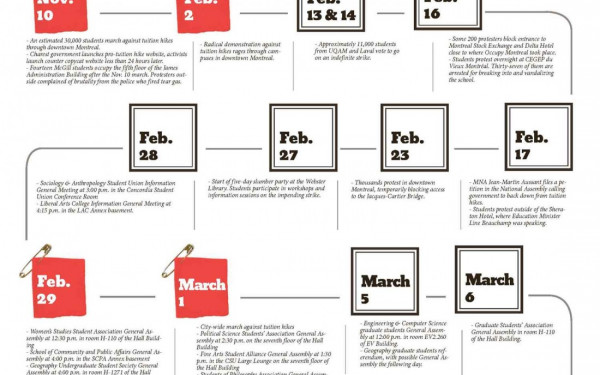Tribunals Not Deterring Future Strikes
Student Associations Talk Strikes Despite Concordia Charges
Liberal Arts students called for a special strike general assembly this week and other associations should follow, which should lead to discussions on how the formal charges from last semester will impact future striking processes.
Last week the tribunals for Concordia student-protesters were suspended. Concordia University has hired a mediator to facilitate the discussions between the students and the professors who charged them. University President Alan Shepard explained they decided to hire a mediator to help find a common ground.
“We’re trying to find a peaceful, non-judicial solution to the conflict,” Shepard said. Hoping that informal solutions lead to a more comfortable path for everyone involved, he added mediation was also an educational opportunity. About the possibility of future strikes, he said the school would continue to prioritize safety.
The students involved in the tribunals will now be represented in the mediation process by the presidents of their student associations. Jason Poirier Lavoie, president of the Political Science Association (PSSA), said he is hoping the mediator will be fair and neutral.
“We are pleased to be able to represent our students in the process,” said Poirier Lavoie. “It is a good step forward in having a much better dialogue concerning students’ right to strike in a democratically voted strike mandate.”
“I’m hopeful that the mediation will be a process of open dialogue where individuals can express their different view points,” said Terry Wilkings, president of the Concordia Student Union. He added it was premature to establish if the tribunals will have an impact on the mobilization.
Last week, the Fine Arts Student Association (FASA), The Liberal Arts Society (LAS) and PSSA all held general assemblies, as eventual strike motions were discussed. On Monday night, the Undergraduate Students of Philosophy Association (SoPhiA) general assembly’s agenda also involved the possibility of calling a strike GA.
For FASA, further discussions will have to wait until November, after the elections of their executive team, but Liberal Arts students announced a special general assembly to consider the question of a strike in two weeks. Political science students voted a motion to mandate their executives to organize a strike GA within ten days, if any Concordia labour union announces a strike vote.
Poirier Lavoie discussed the impact of the precedents set last semester by the administration on future strikes. Students are aware they have to take into account how the university first recognized the strike movement last semester before it became a co-complainant with some professors, and the effect that has on eventual striking strategies, he says.
The PSSA plans on following the same democratic process as before, trying to gather a large assembly, according to Poirier Lavoie. Last semester, students were charged for interrupting classes, after professors crossed picket lines. Future strategies would hence have to involve earlier and harder picketing, which might prevent students from being charged, according to Poirier Lavoie. PSSA will also focus on better communicating with professors and the department to maintain constant discussions with them, he continues.
About the consequences on student mobilization, he says the university is utilizing its students to intimidate them.
“Under the threat of the charges, students who would have been supportive are now afraid of this punitive tool,” said Poirier Lavoie.
Former CSU President Benjamin Prunty commented the charges were discriminatory against students.
“Any attempt to target individuals will only increase the resolve and urgency of the mobilization,” he said.
Aloyse Muller, president of LAS, says students are angry at the administration for being targeted by charges, leading students who were first opposed to the strike to mobilize. He adds that students were considering not identifying themselves while striking, because they were intimidated by the university and of being involved in tribunals.

_900_584_90.jpg)

_600_375_s_c1.png)
_600_375_90_s_c1.jpg)
_600_375_90_s_c1.jpg)
